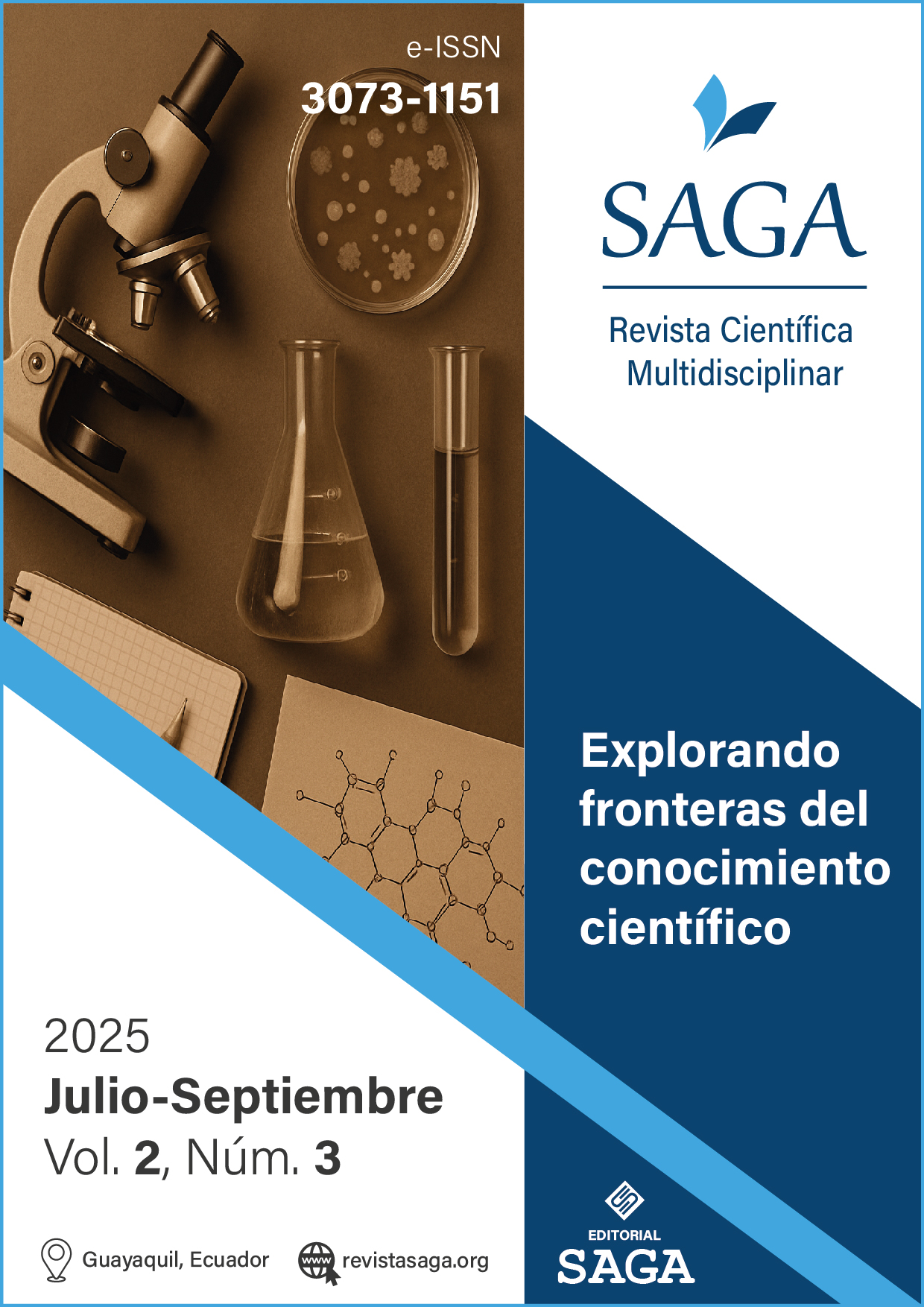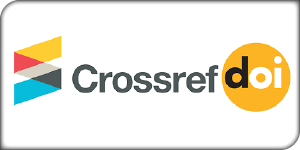The Human Gut Microbiota: Implications in Gastrointestinal Health and Disease
DOI:
https://doi.org/10.63415/saga.v2i3.258Palabras clave:
butyrate, dysbiosis, Ecuador, gut microbiota, Mexico, short-chain fatty acidsResumen
The human gut microbiota plays a central role in gastrointestinal health, yet its alterations in Latin American populations remain understudied. This study aimed to characterize microbial diversity, taxonomic composition, and short-chain fatty acid (SCFA) profiles in patients with gastrointestinal disorders in Mexico and Ecuador. A total of 430 adults (54% female, mean age 42.5 years, mestizo and indigenous backgrounds) were recruited and divided into five groups: inflammatory bowel disease (n=120), irritable bowel syndrome (n=80), colorectal cancer (n=70), celiac disease (n=60), and healthy controls (n=100). Demographic and clinical data were collected using structured questionnaires and validated instruments, while stool samples were analyzed through 16S rRNA sequencing and SCFA quantification. Results showed that alpha diversity was highest in healthy controls and significantly reduced in inflammatory bowel disease and colorectal cancer, with intermediate values in irritable bowel syndrome and celiac disease. Beta diversity analysis demonstrated distinct clustering between healthy and diseased groups, with greater heterogeneity among Ecuadorian participants. Taxonomic analysis revealed depletion of Faecalibacterium prausnitzii and enrichment of Ruminococcus gnavus, Fusobacterium nucleatum, and Bacteroides fragilis in diseased groups. Functional profiling indicated butyrate depletion as a consistent marker of gastrointestinal disorders, with higher propionate levels observed in Ecuador. These findings reinforce the role of microbial diversity and specific taxa as hallmarks of gastrointestinal health and disease, while highlighting the importance of regional research. The study underscores the potential of microbiota-based biomarkers and therapies to inform clinical practice and public health strategies in Latin America.
Descargas
Referencias
Abril-Ulloa, S. V., Carpio-Arias, T. V., Alvarado-Barba, R. A., Ríos-Romero, C. G., Vinueza-Veloz, P., Lima-dos-Santos, S. P., Astudillo-Skliarova, I. E., Arias-Gutiérrez, R. I., Pérez-Quintana, M., Boele, H. J., & Vinueza-Veloz, M. F. (2025). Microbiota, parasitic infections and their relationship with nutritional status and neurocognitive functioning in children from Ecuador — Proyecto Guagua: Research protocol for a cross-sectional study. Frontiers in Public Health, 13, 1505780. https://doi.org/10.3389/fpubh.2025.1505780
Chávez-Carbajal, A., Nirmalkar, K., Pérez-Lizaur, A., Hernández-Quiroz, F., Ramírez-del-Alto, S., García-Mena, J., & Hernández-Guerrero, C. (2019). Gut microbiota and predicted metabolic pathways in a sample of Mexican women affected by obesity and obesity plus metabolic syndrome. International Journal of Molecular Sciences, 20(2), 438. https://doi.org/10.3390/ijms20020438
Coba-Males, M. A., Díaz, M., Molina, C. A., Medrano-Vizcaíno, P., Brito-Zapata, D., Martin-Solano, S., Zurita, M. F., et al. (2024). Gut bacterial communities in roadkill animals: A pioneering study in the Amazon region in Ecuador. PLOS ONE, 19(12), e0313263. https://doi.org/10.1371/journal.pone.0313263
Díaz, M., Villacís, A., Zurita, M. F., Cárdenas, P. A., & Baldeón, M. E. (2021). The Ecuadorian Microbiome Project: A plea to strengthen research capacity in metagenomics and microbiome for Ecuador. Neotropical Biodiversity, 7(1), 26–32. https://doi.org/10.1080/23766808.2021.1938900
García-Gamboa, R., Díaz-Torres, O., Gradilla-Hernández, M. S., Pérez-Brocal, V., Moya, A., González-Avila, M., & Sánchez-Chapul, L. (2024). Gut bacterial composition and nutritional implications in Mexican and Spanish individuals with inflammatory bowel disease compared to healthy controls. International Journal of Molecular Sciences, 25(22), 11887. https://doi.org/10.3390/ijms252211887
Jandhyala, S. M., Talukdar, R., Subramanyam, C., Vuyyuru, H., Sasikala, M., & Reddy, D. N. (2015). Role of the normal gut microbiota. World Journal of Gastroenterology, 21(29), 8787–8803. https://doi.org/10.3748/wjg.v21.i29.8787
Kumar, A. R., Tanwar, R. S., Bhardwaj, R., & Sharma, A. (2024). Impact of gut microbiota on metabolic dysfunction-associated steatohepatitis (MASH) development and progression to hepatocellular carcinoma. European Journal of Medical Research, 29, 72. https://doi.org/10.1186/s40001-024-02072-3
Maya-Lucas, O., Murugesan, S., Nirmalkar, K., Alcaraz, L. D., Hoyo-Vadillo, C., Pizano-Zárate, M. L., García-Mena, J., et al. (2019). The gut microbiome of Mexican children affected by obesity. Pediatric Obesity, 14(4), e12512. https://doi.org/10.1111/ijpo.12512
McIlroy, J., Ianiro, G., Mukhopadhya, I., Hansen, R., & Hold, G. L. (2018). Gut microbiome, dysbiosis and antibiotic treatment in inflammatory bowel disease. Journal of Crohn’s and Colitis, 12(2), 131–136. https://doi.org/10.1093/ecco-jcc/jjx148
Méndez-Salazar, E. O., Ortiz-López, M. G., Granados-Silvestre, M. L., Palacios-González, B., & Menjivar, M. (2018). Altered gut microbiota and compositional changes in obese and undernourished Mexican children living in low-income neighborhoods. Frontiers in Microbiology, 9, 2494. https://doi.org/10.3389/fmicb.2018.02494
Olvera-Rosales, L.-B., Cruz-Guerrero, A.-E., Ramírez-Moreno, E., Quintero-Lira, A., Contreras-López, E., Jaimez-Ordaz, J., González-Olivares, L.-G., et al. (2021). Impact of gut microbiota balance on the health–disease relationship: Importance of consuming probiotics and prebiotics. Foods, 10(6), 1261. https://doi.org/10.3390/foods10061261
Portincasa, P., Grassi, S., Di Ciaula, A., Bonfrate, L., & Wang, D. Q.-H. (2022). Gut microbiota and short-chain fatty acids: Implications in glucose metabolism. International Journal of Molecular Sciences, 23(3), 1105. https://doi.org/10.3390/ijms23031105
Sánchez-Quinto, A., Cerqueda-García, D., Falcón, L. I., Gaona, O., Martínez-Correa, S., Nieto, J., & Santoyo, I. (2020). Gut microbiome in children from indigenous and urban communities in México: Different subsistence models, different microbiomes. Microorganisms, 8(10), 1592. https://doi.org/10.3390/microorganisms8101592
Shen, Y., Gong, J., Ding, C., Dong, X., Zhao, P., & Zhou, C. (2025). Gut microbiota dysbiosis: Pathogenesis, diseases and therapies. Signal Transduction and Targeted Therapy, 10, 32. https://doi.org/10.1038/s41392-024-01507-7
Suriano, F., van Hul, M., & Cani, P. D. (2021). Gut microbiota and liver diseases: From pathophysiology to new therapeutic strategies. Cell Metabolism, 33(12), 2271–2291. https://doi.org/10.1016/j.cmet.2021.10.007
Tilg, H., Zmora, N., Adolph, T. E., & Elinav, E. (2020). The intestinal microbiota fuelling metabolic inflammation. Nature Reviews Immunology, 20, 40–54. https://doi.org/10.1038/s41577-019-0198-4
Vinderola, G., Ouwehand, A. C., Salminen, S., & Benno, Y. (2020). ISAPP consensus on the definition and scope of postbiotics. Nature Reviews Gastroenterology & Hepatology, 17(12), 751–759. https://doi.org/10.1038/s41575-020-0340-2
Wang, Z., Zhao, Y., & Zhao, Y. (2022). Gut microbiota dysbiosis and liver diseases: A new mechanistic insight. Journal of Translational Medicine, 20, 112. https://doi.org/10.1186/s12967-022-03355-8
Wong, S. H., Yu, J., & Sung, J. J. Y. (2019). The role of gut microbiota in the pathogenesis and treatment of colorectal cancer. Therapeutic Advances in Gastroenterology, 12, 1756284819884191. https://doi.org/10.1177/1756284819884191
Zhang, D., Li, S., Wang, N., Tan, H.-Y., Zhang, Z., & Feng, Y. (2023). The cross-talk between gut microbiota and lungs in common lung diseases. Cell & Bioscience, 13, 72. https://doi.org/10.1186/s13578-023-01219-9
Publicado
Número
Sección
Licencia
Derechos de autor 2025 Mayra Nayeli Estrada García, Rafael Rodríguez Ornelas, Ricardo Xavier Cárdenas Zambrano, Marijose Santillán Guevara, Ariana Lissette Franco Bourne, Perla María Vargas Quezada, Melissa Sarahí Jaime Gutiérrez, Rogelio Santos Solís (Autor/a)

Esta obra está bajo una licencia internacional Creative Commons Atribución-NoComercial 4.0.



























